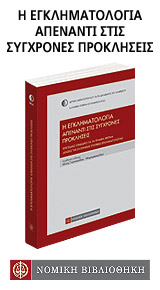Ατζέντα
Τεύχος 27 - Μάρτιος 2015
 Εκτύπωση Εκτύπωση
 Αποστολή Αποστολή

 Μέγεθος γραμμάτων Μέγεθος γραμμάτων
Τριήμερο Εγκληματολογικό Συνέδριο προς τιμήν του Ομότιμου Καθηγητή κ. Νέστορα Κουράκη
Τριήμερο Εγκληματολογικό Συνέδριο προς τιμήν του ομότιμου Καθηγητή Νέστορα Κουράκη διοργανώνεται στην Πέμπτη, Παρασκευή και Σάββατο, 2 - 4/4/2015.Το
συνέδριο θα λάβει χώρα στην Αίθουσα Τελετών του Δικηγορικού Συλλόγου Αθηνών (Ακαδημίας 60) με κεντρικό θέμα «Κρίση, Έγκλημα και Σύστημα Ποινικής Καταστολής»Το συνέδριο συνδιοργανώνεται από:- Εργαστήριο Ποινικών και Εγκληματολογικών Ερευνών του Εθνικού και Καποδιστριακού Πανεπιστημίου Αθηνών
- Τμήμα Κοινωνικής Διοίκησης και Πολιτικής Επιστήμης του Δημοκρίτειου Πανεπιστημίου Θράκης
- Τμήμα Ψυχολογίας του Πανεπιστημίου Κρήτης
- Τομέας Εγκληματολογίας Τμήματος Κοινωνιολογίας του Παντείου Πανεπιστημίου
- Τμήμα Νομικής του Πανεπιστημίου Λευκωσίας
- ΝΠΙΔ ΕΠΑΝΟΔΟΣ
Επιστημονική Επιτροπή:
Σοφία
Βιδάλη, Πάρη Ζαγούρα, Χριστίνα Ζαραφωνίτου, Δημήτρης Ζιούβας, Όλγα
Θεμελή, Νίκος Κουλούρης, Μαρία Κρανιδιώτη, Γιάννης Πανούσης, Αγγελική
Πιτσελά, Δήμητρα Σορβατζιώτη, Καλλιόπη Σπινέλλη, Αθανασία Συκιώτου,
Χρήστος Τσουραμάνης
Οργανωτική Επιτροπή:
Μαργαρίτα
Γασπαρινάτου, Πάρη Ζαγούρα, Δημήτρης Ζιούβας, Όλγα Θεμελή, Νίκος
Κουλούρης, Μάρθα Λεμπέση, Φωτεινή Μηλιώνη, Βασιλική Σαλεσιώτη, Δήμητρα
Σορβατζιώτη, Φώτης Σπυρόπουλος
Κατεβάστε το οριστικό πρόγραμμα
|
|
 Combating Corruption
Konstantinos Panagiotopoulos,
Brigadier General, Head of the Directorate of Management & Strategy for Home Affairs, Ministry of Public Order & Citizen Protection.
Corruption is a deeply anti-social behaviour that undermines the democratic institutions, jeopardizes the economic development and the rule of law. The importance of combating corruption is demonstrated by the fact that a multitude of leading international organizations deal with it, such as the European Union, the Council of Europe, United Nations, the G8, the OECD Financial Action Task Force and INTERPOL. The phenomenon of corruption refers to large or small countries, to both rich and poor. However, we have to recognize that the results are more catastrophic for the economies of those countries that are underdeveloped or under development.
read more...
----------------------------------------------------------------
The relevance of perceptions of corruption to crime prevention in Greece
PhD, Professor of Criminology at the Sociology Department of Panteion University of Social and Political Science
The article refers to the general findings of a research project which examined the relevance of perceptions of corruption to crime prevention in Greece.It also includes the findings of official reports published by various control bodies against corruption in Greece during the last decades, and the results of the European Values Surveys of 1999/2000 and 2008 in order to associate the existing views with facts and hard data.
The project began on January 1st 2006 and ended on July 31st 2009 and it consisted of three phases. During the first phase, in order to assess existing conceptualizations of corruption, we studied official documents and during the second phase, we discussed in private and interviewed anonymously various decision-makers: politicians, representatives of public administration, justice, media, police, economy and NGOs. During the third phase we analysed theoretically our findings. The content analysis of texts and interviews was carried out with the software Atlas-ti 5.0. read more..
διαβάστε περισσότερα... |
  | An Introduction to the Special Issue on the Problem of Corruption and on Feasible Ways of Tackling it
by Professor Nestor Courakis
Guest Editor of "The Art of Crime", issue 7
The issue of corruption was first seen as being at the centre of
attention in the US mainly during the 1970s, due to bribery practices which
came to light in foreign markets on behalf of notorious American companies.
However, this interest was only extended worldwide in the 1990s, and so, in
many developed economies of the West, cases of corruption seemed to have a
broader scope and a corresponding negative impact on the smooth functioning of
the economy. This evolution was helped by the collapse of the regimes of the
so-called "real socialism" and the rapid development of economic
"globalization", and with all the consequences of these on lifting
restrictions on international markets and in a display of extreme forms of
competition.
Indeed, there were many multinational companies which tried, through unscrupulous
means, to secure jobs or to dominate national contracts within their own
country or in other countries. These cases led to a serious additional burden
on taxpayers with useless expenditure, e.g. by purchasing equipment or with exorbitant
increased public spending on low-quality public works and services. To cope
with this situation, there has been drafting and signing of interstate
agreements against corruption by leading international and European
organizations, such as the OECD (17.12.1997), or the European Community as it was
formally known (26.5.1997), the Council of Europe (27.1.1999 and 22.7.2003) and
the United Nations (31.10.2003).
Furthermore, control mechanisms were established, for the verification
of corruption problems in different countries and to formulate proposals to
tackle these problems through evaluation reports. The Groupe d ΄États Contre la
Corruption (abbreviated: GRECO) from the Council of Europe should especially be
mentioned at this point, as well as the OECD Working Group on Bribery, the
Implementary Review Group UNCAC and, more recently, the European Commission which
publishes the EU Anti-Corruption Report on a regular basis.
διαβάστε περισσότερα... |
|
    |  |
 |
 |
  Anti-corruption efforts in Greece: Between Law in Books and Law in Action
by Nestor Courakis
Professor, University of Nicosia, em. Professor, University of Athens
Due to serious financial and administration problems, there has been an atmosphere of immense crisis in Greecesince 2009. This situation provoked the intervention, among others, of a European Commission Task Force, which agreed with the Greek authorities on a Road Map for technical assistance in the field of Anti-Corruption in October 2012 . As a result, a National Anti-Corruption Action Plan called “Transparency” was prepared by the Ministry of Justice, Transparency and Human Rights in January 2013 and a National Anti-Corruption Coordinator together with a Coordination Committee and an Advisory Board were appointed in May and June 2013 (Law Nr. 4152/2013, Paragraph IG –these bodies were abolished in February & March 2015 and substituted by a special Ministry and a Secretary General for combatting corruption: art. 9 ff., Law Nr. 4320/2015).
read more...
----------------------------------------------------------------
National Anti Corruption Coordinator: The Greek answer against the corruption challenge
By Ioannis Tentes
Honorary Prosecutor of the High Court of Justice, National Coordinator against Corruption until March 2015
Corruption constitutes a timeless and generalized phenomenon; an unhealthy phenomenon with multiple and severe consequences. Corruption wears down institutions; it is a danger to democracy, it causes inequalities and it affects human rights. Furthermore, corruption deprives public resources, causes distortion to the competition and prevents economic growth.
read more...
διαβάστε περισσότερα... |
|
      |
|
|





